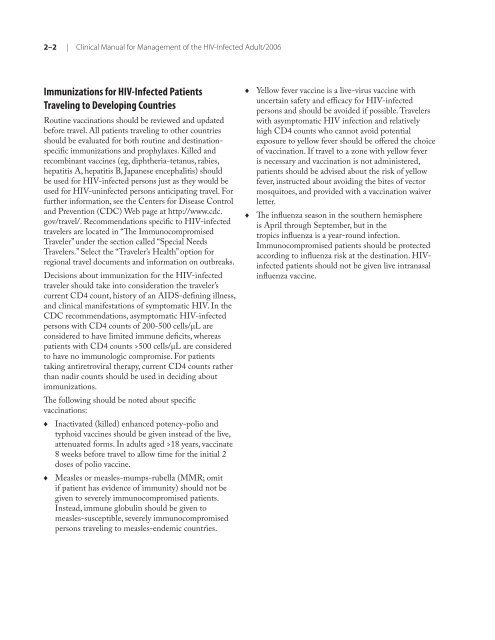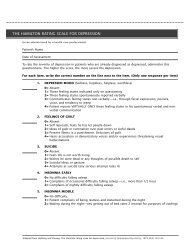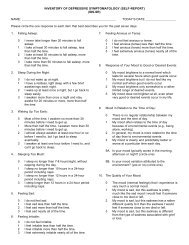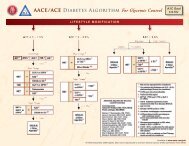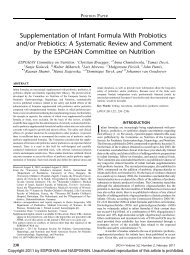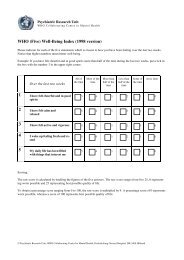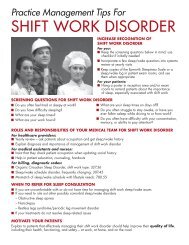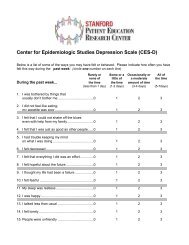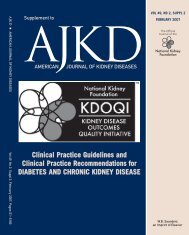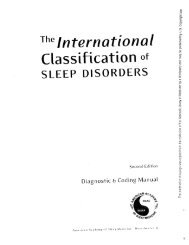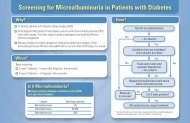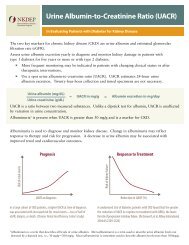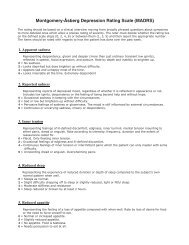Clinical Manual for Management of the HIV-Infected ... - myCME.com
Clinical Manual for Management of the HIV-Infected ... - myCME.com
Clinical Manual for Management of the HIV-Infected ... - myCME.com
You also want an ePaper? Increase the reach of your titles
YUMPU automatically turns print PDFs into web optimized ePapers that Google loves.
2–2 | <strong>Clinical</strong> <strong>Manual</strong> <strong>for</strong> <strong>Management</strong> <strong>of</strong> <strong>the</strong> <strong>HIV</strong>-<strong>Infected</strong> Adult/2006<br />
Immunizations <strong>for</strong> <strong>HIV</strong>-<strong>Infected</strong> Patients<br />
Traveling to Developing Countries<br />
Routine vaccinations should be reviewed and updated<br />
be<strong>for</strong>e travel. All patients traveling to o<strong>the</strong>r countries<br />
should be evaluated <strong>for</strong> both routine and destinationspecific<br />
immunizations and prophylaxes. Killed and<br />
re<strong>com</strong>binant vaccines (eg, diph<strong>the</strong>ria-tetanus, rabies,<br />
hepatitis A, hepatitis B, Japanese encephalitis) should<br />
be used <strong>for</strong> <strong>HIV</strong>-infected persons just as <strong>the</strong>y would be<br />
used <strong>for</strong> <strong>HIV</strong>-uninfected persons anticipating travel. For<br />
fur<strong>the</strong>r in<strong>for</strong>mation, see <strong>the</strong> Centers <strong>for</strong> Disease Control<br />
and Prevention (CDC) Web page at http://www.cdc.<br />
gov/travel/. Re<strong>com</strong>mendations specific to <strong>HIV</strong>-infected<br />
travelers are located in “The Immuno<strong>com</strong>promised<br />
Traveler” under <strong>the</strong> section called “Special Needs<br />
Travelers.” Select <strong>the</strong> “Traveler’s Health” option <strong>for</strong><br />
regional travel documents and in<strong>for</strong>mation on outbreaks.<br />
Decisions about immunization <strong>for</strong> <strong>the</strong> <strong>HIV</strong>-infected<br />
traveler should take into consideration <strong>the</strong> traveler’s<br />
current CD4 count, history <strong>of</strong> an AIDS-defining illness,<br />
and clinical manifestations <strong>of</strong> symptomatic <strong>HIV</strong>. In <strong>the</strong><br />
CDC re<strong>com</strong>mendations, asymptomatic <strong>HIV</strong>-infected<br />
persons with CD4 counts <strong>of</strong> 200-500 cells/µL are<br />
considered to have limited immune deficits, whereas<br />
patients with CD4 counts >500 cells/µL are considered<br />
to have no immunologic <strong>com</strong>promise. For patients<br />
taking antiretroviral <strong>the</strong>rapy, current CD4 counts ra<strong>the</strong>r<br />
than nadir counts should be used in deciding about<br />
immunizations.<br />
The following should be noted about specific<br />
vaccinations:<br />
♦<br />
♦<br />
Inactivated (killed) enhanced potency-polio and<br />
typhoid vaccines should be given instead <strong>of</strong> <strong>the</strong> live,<br />
attenuated <strong>for</strong>ms. In adults aged >18 years, vaccinate<br />
8 weeks be<strong>for</strong>e travel to allow time <strong>for</strong> <strong>the</strong> initial 2<br />
doses <strong>of</strong> polio vaccine.<br />
Measles or measles-mumps-rubella (MMR; omit<br />
if patient has evidence <strong>of</strong> immunity) should not be<br />
given to severely immuno<strong>com</strong>promised patients.<br />
Instead, immune globulin should be given to<br />
measles-susceptible, severely immuno<strong>com</strong>promised<br />
persons traveling to measles-endemic countries.<br />
♦<br />
♦<br />
Yellow fever vaccine is a live-virus vaccine with<br />
uncertain safety and efficacy <strong>for</strong> <strong>HIV</strong>-infected<br />
persons and should be avoided if possible. Travelers<br />
with asymptomatic <strong>HIV</strong> infection and relatively<br />
high CD4 counts who cannot avoid potential<br />
exposure to yellow fever should be <strong>of</strong>fered <strong>the</strong> choice<br />
<strong>of</strong> vaccination. If travel to a zone with yellow fever<br />
is necessary and vaccination is not administered,<br />
patients should be advised about <strong>the</strong> risk <strong>of</strong> yellow<br />
fever, instructed about avoiding <strong>the</strong> bites <strong>of</strong> vector<br />
mosquitoes, and provided with a vaccination waiver<br />
letter.<br />
The influenza season in <strong>the</strong> sou<strong>the</strong>rn hemisphere<br />
is April through September, but in <strong>the</strong><br />
tropics influenza is a year-round infection.<br />
Immuno<strong>com</strong>promised patients should be protected<br />
according to influenza risk at <strong>the</strong> destination. <strong>HIV</strong>infected<br />
patients should not be given live intranasal<br />
influenza vaccine.


